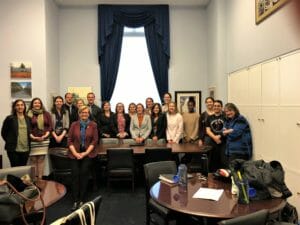Welcome to Wednesdays from Washington!
Week 1 – Featuring Congresswoman Chellie Pingree
It may be ~2,300 miles from the Sun Devil Stadium to the National Capitol building in Washington, DC, but as the COVID-19 pandemic has shown, we are more connected now than ever before in history. Not only are we connected, but we are interdependent and deeply responsible for one another. Knowing this, we here at the Swette Center believe that, despite our distance, it is absolutely essential to be connected to and informed about happenings across the country and especially in our nation’s capital.
We also believe it’s essential to foster this connectedness with the federal policy world in each of our students. These students are the next generation of leaders in this country and abroad, poised to make transformative changes in our collective food systems. This past March, our 19 new leaders from the inaugural ASU Food Policy and Sustainability Leadership cohort landed in Washington D.C. for a week of meetings and knowledge sharing sessions with key leaders from various government, private industry, lobbying, and NGO organizations.
Though it was an odd time in D.C., at the beginning of the COVID-19 pandemic, the lessons learned and connections built by our students were truly invaluable and we want to share some of the experience with you! Over the course of the summer, the Swette Center will be featuring a blog from one of our students about the trip to Washington in a new “Wednesdays from Washington” series. It is our hope that through this series, you too can feel a little more connected to the world of D.C. and we hope to pique your interest to take a closer look at some of the people and organizations featured! From all of us here at the Swette Center: “Welcome to Washington!”
-The Swette Center Team
This blog post was written by Arizona State University graduate student Devin Foote. In addition to studying Food Policy and Sustainability Leadership at ASU, Devin is a food systems program officer at the W.K. Kellogg Foundation in where he supports the foundation’s efforts to promote thriving children, working families and equitable communities.
As state, national and global supply chains continue to show the vulnerabilities of an extremely efficient yet consolidated food system and before the more crisis-oriented call for a rethinking of our food and agriculture sectors, we sat down with Representative Chellie Pingree (D-Maine) to discuss her recent bill, H.R. 5861, the Agriculture Resilience Act. The Act provides an alternative approach to the rebuilding and repair that is needed in the years ahead. As Rep. Pingree shared with us, the Act’s approach overlaps significantly with Senator Cory Booker’s Climate Stewardship Act in its boosting of existing farm conservation programs, but also pairs agriculture with forestry and wetland conservation and food production. The Act lays out 12 goals to meet over the next 20 years and directs the USDA to develop a plan to reach them. In addition to net zero, the goals include restoring at least half of lost soil carbon, reducing greenhouse gas emissions from ruminants (i.e., cattle, sheep, and goats) by at least 50 percent, tripling on-farm renewable energy production, and reducing food waste by at least 75 percent. Six subsequent sections address research, soil health, farmland preservation and farm viability, pasture-based livestock, on-farm renewable energy, and food loss and waste. The bill would add climate change adaptation and mitigation to various existing programs as a priority focus. For immediate needs and the reemergence of soil health and importance as a climate mitigation tool – many popular farm bill conservation programs get a boost: funding for the Conservation Stewardship Program (CSP), for example, would more than quadruple by 2024.
Congresswoman Pingree and her staff made it clear that the Act was intended to be a broad platform to build from and therefore does not lay out regulations. While the Act could incentivize more sustainable practices, it’s unlikely it would result in any major, immediate shifts in production methods. To the Congresswoman’s point, typically a bill of this kind is not introduced with the expectation that it will move forward intact. Instead, it offers a template for programs that can be incorporated into other legislative packages. As we’ve learned over and over again in this program – timing is everything and it is therefore no coincidence that the legislation was introduced a week after Secretary Perdue unveiled an “Agriculture Innovation Agenda” with the stated goal to increase production by 40 percent while cutting “the environmental footprint of U.S. agriculture” in half by 2050. The agenda, while vague, includes mentions of “enhancing” carbon sequestration and reducing fertilizer pollution loss in watersheds. As Congresswoman Pingree shared with our class, she hopes that pieces of the Act may be used during the next appropriations cycle or in the next farm bill – with a keen eye for the potential for “comprehensive climate legislation.”
Opponents to the legislation are likely to push back on any potential increases to current programs – if there are any silver linings during the current COVID era it’s that the urgency of climate change (causing future pandemics) couldn’t be more important. The Act keeps funding and workstreams in existing USDA programs – ones that we already know work, and how they could be improved with increased funding, more staffing, more technical assistance. As we look into the future of climate change and climate resilience, we’re going to spend money – the current COVID crisis and the federal government’s response in spending nearly $3 trillion in a single month couldn’t resonate more. Whether it’s changes to the way we build buildings or to our transportation system, there’s going to be an investment made – as the Congresswoman said on March 9th, “It might be a direct investment where the country says, we’re in trouble—we got to do something about it—I wanted to make sure agriculture was at the table.” What a great roadmap that under the right political circumstances could enact the biggest, most comprehensive climate and agriculture legislation that addresses everything from research to conservation to energy to food waste.” Pingree’s future is one that I want to be part of.
On behalf of the entire ASU Food Policy and Sustainability Cohort, I would like to extend our sincere appreciation to Congresswoman Pingree and her staff for their tireless work advancing sustainable agriculture and for giving us the opportunity to meet and discuss this important piece of legislation!
As we navigate these uncertain times it is more important than ever to have a robust network of food and agriculture policy leaders to make sensible and responsible decisions. Could you be one of those people? Learn more about answering this call by checking out the Food Policy and Sustainability Leadership Program at ASU!

